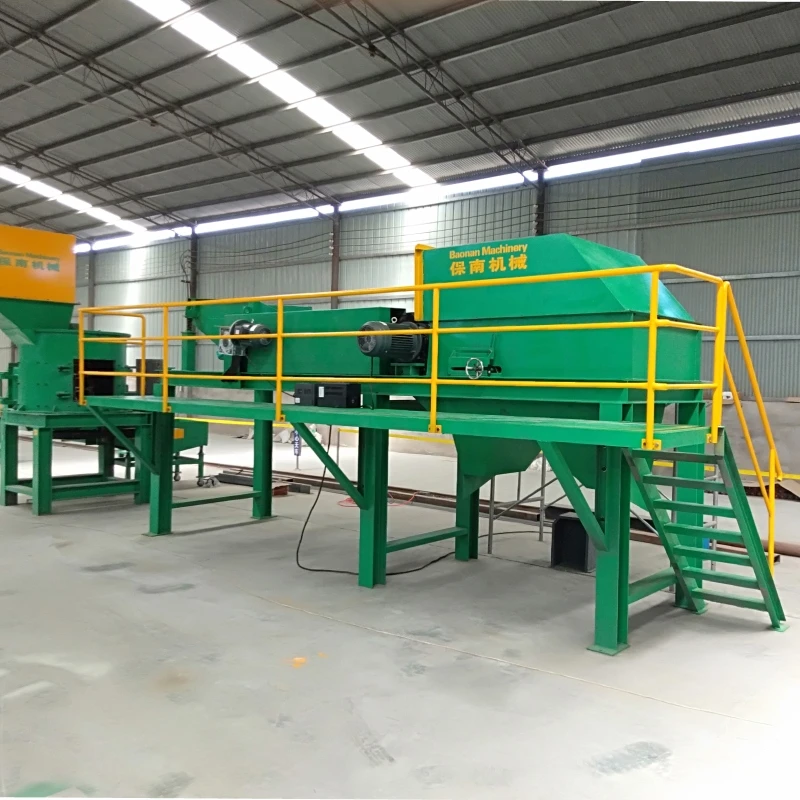

Дек . 29, 2024 10:12 Back to list
The Role and Importance of MSW Sorting Plants
Municipal Solid Waste (MSW) management is a pressing challenge faced by urban areas around the globe. With increasing urbanization, the volume of waste produced daily has reached staggering levels, necessitating effective waste management solutions. MSW sorting plants play a pivotal role in addressing these challenges, functioning as the first line of defense in the recycling and waste management process. This article explores the significance of MSW sorting plants, their operational mechanisms, and their impact on sustainable waste management.
Understanding MSW Sorting Plants
MSW sorting plants are specialized facilities designed to separate recyclables from non-recyclables within the waste stream. The waste that arrives at these facilities is diverse, containing various materials such as plastics, metals, glass, paper, and organic matter. The primary objective of MSW sorting plants is to maximize the recovery of valuable materials, reduce landfill use, and minimize the environmental impact of waste disposal.
The sorting process typically begins with the manual and mechanical separation of waste. Workers and machines work in tandem to separate different types of materials. For instance, automated sorting technology, such as conveyor belts equipped with optical sensors and air jets, can efficiently identify and separate materials based on size, weight, and composition. This initial separation is crucial as it determines the quality and marketability of the recovered materials.
The Benefits of MSW Sorting Plants
1. Resource Recovery One of the most significant benefits of MSW sorting plants is their ability to recover valuable resources from waste. Recyclable materials such as metals, glass, and certain plastics can be processed and reintroduced into the manufacturing supply chain. This not only conserves natural resources but also reduces the energy required to produce new materials.
2. Reduction of Landfill Waste The effective operation of MSW sorting plants significantly decreases the volume of waste directed to landfills. By diverting recyclable and compostable materials, these facilities help to extend the lifespan of existing landfills and reduce the need for new landfill sites, which are often met with public opposition due to environmental concerns.

3. Environmental Protection Proper waste sorting and management contribute to environmental sustainability. By minimizing the amount of waste that ends up in landfills, MSW sorting plants help reduce pollution, greenhouse gas emissions, and soil and water contamination. This is particularly important in mitigating the adverse effects of climate change.
4. Economic Benefits The recycling industry, bolstered by MSW sorting plants, generates jobs and stimulates economic growth. From collection to processing, recycling contributes to job creation in various sectors. Moreover, the recovered materials can be sold, providing economic returns that can be reinvested into further waste management initiatives.
5. Public Awareness and Engagement Operating an MSW sorting plant also fosters community involvement and awareness about waste management and recycling practices. Educational programs and public outreach initiatives can encourage residents to participate in sorting their waste, thereby enhancing recycling rates and promoting a culture of sustainability.
Challenges and Future Prospects
Despite their advantages, MSW sorting plants face challenges, including fluctuating market demand for recyclables, contamination issues, and the need for technological advancements. Contamination occurs when non-recyclable materials are mixed with recyclables, leading to increased processing costs and reduced quality of the recycled materials. Therefore, continuous public education on proper waste sorting is essential.
Future prospects for MSW sorting plants look promising, especially with advancements in technology. Innovations such as artificial intelligence in sorting processes can lead to more efficient and accurate materials recovery. Additionally, a shift towards a circular economy—where waste is minimized, and materials are continually reused—could redefine the role of MSW sorting plants in sustainable waste management.
Conclusion
In summary, MSW sorting plants are integral to effective waste management strategies in urban areas. By recovering valuable materials, reducing landfill use, protecting the environment, and contributing to economic growth, these facilities play a critical role in fostering sustainable practices. As cities continue to grow and waste production increases, the importance of MSW sorting plants will only become more pronounced, highlighting the need for ongoing investment, innovation, and public engagement in waste management initiatives.
Latest news
Troubleshooting Common Eddy Separator Problems
NewsJul.04,2025
The Role of Metal Recycling Plants in Circular Economy
NewsJul.04,2025
The Impact of Recycling Line Pickers on Waste Management Costs
NewsJul.04,2025
Safety Features Every Metal Shredder Should Have
NewsJul.04,2025
How Industrial Shredders Improve Waste Management Systems
NewsJul.04,2025
How Cable Granulators Contribute to Sustainable Recycling
NewsJul.04,2025